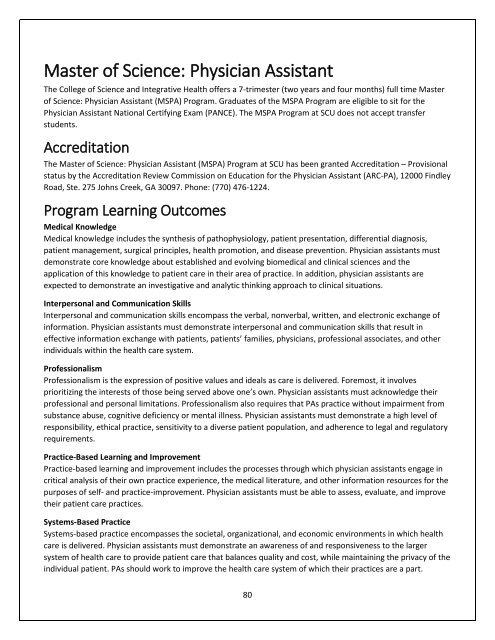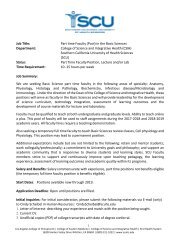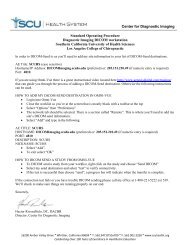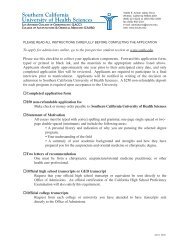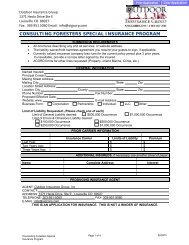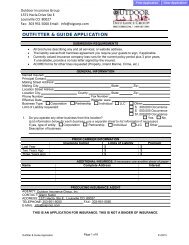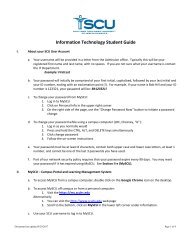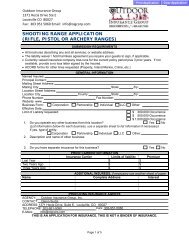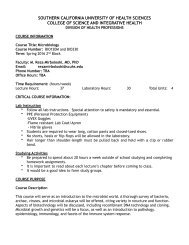Vision, Mission, and Guiding Principles for SCUHS
Southern California University of Health Sciences will be recognized as the premier evidence-based integrative healthcare university. in this PDF we are discussing about our Vision, Mission, and Guiding Principles. Please have a look. you can also go with this link: https://bit.ly/2JuIItL
Southern California University of Health Sciences will be recognized as the premier evidence-based integrative healthcare university. in this PDF we are discussing about our Vision, Mission, and Guiding Principles. Please have a look. you can also go with this link: https://bit.ly/2JuIItL
Create successful ePaper yourself
Turn your PDF publications into a flip-book with our unique Google optimized e-Paper software.
Master of Science: Physician Assistant<br />
The College of Science <strong>and</strong> Integrative Health offers a 7-trimester (two years <strong>and</strong> four months) full time Master<br />
of Science: Physician Assistant (MSPA) Program. Graduates of the MSPA Program are eligible to sit <strong>for</strong> the<br />
Physician Assistant National Certifying Exam (PANCE). The MSPA Program at SCU does not accept transfer<br />
students.<br />
Accreditation<br />
The Master of Science: Physician Assistant (MSPA) Program at SCU has been granted Accreditation – Provisional<br />
status by the Accreditation Review Commission on Education <strong>for</strong> the Physician Assistant (ARC-PA), 12000 Findley<br />
Road, Ste. 275 Johns Creek, GA 30097. Phone: (770) 476-1224.<br />
Program Learning Outcomes<br />
Medical Knowledge<br />
Medical knowledge includes the synthesis of pathophysiology, patient presentation, differential diagnosis,<br />
patient management, surgical principles, health promotion, <strong>and</strong> disease prevention. Physician assistants must<br />
demonstrate core knowledge about established <strong>and</strong> evolving biomedical <strong>and</strong> clinical sciences <strong>and</strong> the<br />
application of this knowledge to patient care in their area of practice. In addition, physician assistants are<br />
expected to demonstrate an investigative <strong>and</strong> analytic thinking approach to clinical situations.<br />
Interpersonal <strong>and</strong> Communication Skills<br />
Interpersonal <strong>and</strong> communication skills encompass the verbal, nonverbal, written, <strong>and</strong> electronic exchange of<br />
in<strong>for</strong>mation. Physician assistants must demonstrate interpersonal <strong>and</strong> communication skills that result in<br />
effective in<strong>for</strong>mation exchange with patients, patients’ families, physicians, professional associates, <strong>and</strong> other<br />
individuals within the health care system.<br />
Professionalism<br />
Professionalism is the expression of positive values <strong>and</strong> ideals as care is delivered. Foremost, it involves<br />
prioritizing the interests of those being served above one’s own. Physician assistants must acknowledge their<br />
professional <strong>and</strong> personal limitations. Professionalism also requires that PAs practice without impairment from<br />
substance abuse, cognitive deficiency or mental illness. Physician assistants must demonstrate a high level of<br />
responsibility, ethical practice, sensitivity to a diverse patient population, <strong>and</strong> adherence to legal <strong>and</strong> regulatory<br />
requirements.<br />
Practice-Based Learning <strong>and</strong> Improvement<br />
Practice-based learning <strong>and</strong> improvement includes the processes through which physician assistants engage in<br />
critical analysis of their own practice experience, the medical literature, <strong>and</strong> other in<strong>for</strong>mation resources <strong>for</strong> the<br />
purposes of self- <strong>and</strong> practice-improvement. Physician assistants must be able to assess, evaluate, <strong>and</strong> improve<br />
their patient care practices.<br />
Systems-Based Practice<br />
Systems-based practice encompasses the societal, organizational, <strong>and</strong> economic environments in which health<br />
care is delivered. Physician assistants must demonstrate an awareness of <strong>and</strong> responsiveness to the larger<br />
system of health care to provide patient care that balances quality <strong>and</strong> cost, while maintaining the privacy of the<br />
individual patient. PAs should work to improve the health care system of which their practices are a part.<br />
80


